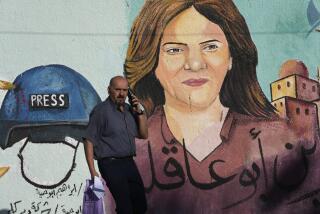A Deathly Silence, to Cover What? : Iraq: The regime came up with a brutal circus to divert attention from its efforts, like those going on in Libya, to manufacture battlefield chemical weapons.
- Share via
Iraq’s hasty hanging of British-based journalist Farzad Bazoft has been seen, quite correctly, as an attempt to impose a deathly silence on any journalist who might have the temerity to investigate events that could prove embarrassing to the regime of Saddam Hussein.
A number of Middle Eastern reporters and editors, even a cartoonist, have been assassinated in Beirut, London and elsewhere for appearing to criticize this or that Arab government or its leader. But poor Bazoft is, as far as we know, the first to be tried and officially executed by a state while he was in the pursuit of a story.
It is always helpful to look at the event from an Iraqi point of view. Gallows, like crosses, have great symbolic value. They are used, just as they were in Europe and America in times past, not just to punish but also to warn. In this case the message is clearly not directed first and foremost toward outsiders like British Prime Minister Margaret Thatcher, who tried to get the death sentence called off, but to an audience much closer home. One part of it is to show that the police and the security forces are ever vigilant. But in this case there is much more to it than that.
During the long war with Iran, the Iraqi army tested and perfected the use of several new battlefield weapons. One clearly was for the tactical use of poison gas. Through the use of helicopters and other methods, the Iraqis could target particular Iranian troop formations in an unusually precise way. This not only gave them an immediate military advantage but also played a major role in the progressive undermining of Iranian morale. It is an advantage that the present Iraqi leadership clearly intends to continue developing for use in any future war.
In these circumstances the explosion that destroyed part of the secret military installation south of Baghdad last August was clearly a great embarrassment to the regime. It may be surmised that it also created a considerable problem because, the damage being so great, it proved impossible to discover whether the explosion was an accident or the result of deliberate sabotage. By accusing Bazoft of being an Israeli spy, the regime was able to suggest that, perhaps, the Israelis had something to do with the explosion without having to prove how it was actually done. Among many other things, this helped to create a useful alibi for the regime’s own carelessness among those members of the Iraqi population who must know very well, whether through rumor or their official connections, that something at the secret plant had gone very wrong. Either the science used there, or the system of security, was grievously at fault.
It may only be a coincidence, but it is also interesting to note that the very day that Bazoft was hanged there came news of another vast explosion at a secret Middle Eastern chemical plant. This time it was at Rabta, Libya, where mustard and nerve gas was being made. Once again, the destruction seems to have been such that there is no way for the authorities to discover whether it was an accident or the work of saboteurs. Once again, it makes the whole thing a little less embarrassing if attention can be focused on the alleged existence of foreign “spies,” now described as German or French.
Looked at in this light, Farzad Bazoft’s execution seems part of a highly charged process in which at least two Middle Eastern regimes are trying to develop battlefield chemical weapons in plants that are either unsafe or open to sabotage--or probably both.
It is obviously a major story. With the hanging of Bazoft in Baghdad, journalists who might wish to investigate it in its local context have been well and truly warned off. But we can be sure that there will be many others who will take up the challenge to pursue it elsewhere--in Washington, in Europe and in Israel.
More to Read
Sign up for Essential California
The most important California stories and recommendations in your inbox every morning.
You may occasionally receive promotional content from the Los Angeles Times.













